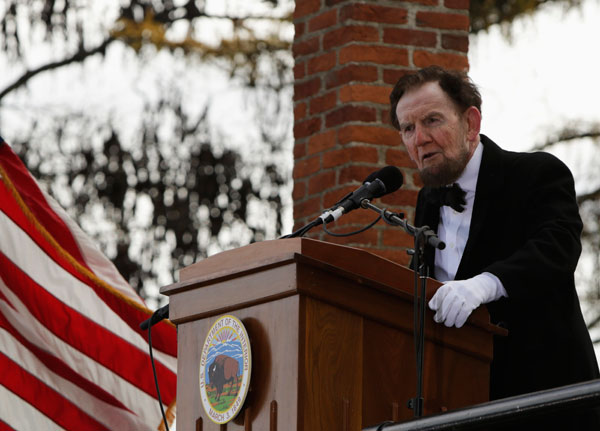 |
|
James Getty, portraying US President Abraham Lincoln, delivers the Gettysburg Address at the Gettysburg National Cemetery in Pennsylvania November 19, 2013. Lincoln travelled to Gettysburg in 1863 to deliver a few concluding remarks at a formal dedication. Today marks the 150th anniversary of Lincoln's famous two-minute speech.[Photo/Agencies] |
GETTYSBURG, Pa. — In solemnity, thousands gathered on a central Pennsylvania battlefield park Tuesday to honor a speech given 150 years ago that President Abraham Lincoln predicted would not be long remembered.
The inspirational and famously short Gettysburg Address was praised for reinvigorating national ideals of freedom, liberty and justice amid a Civil War that had torn the country into pieces.
"President Lincoln sought to heal a nation's wounds by defining what a nation should be," said Pennsylvania Gov. Tom Corbett, calling Lincoln's words superb, his faith deep and his genius profound. "Lincoln wrote his words on paper, but he also inscribed them in our hearts."
Echoing Lincoln, keynote speaker and Civil War historian James McPherson said the president took the dais in November 1863 at a time when it looked like the nation "might indeed perish from the earth."
"The Battle of Gettysburg became the hinge of fate on which turned the destiny of that nation and its new birth of freedom," McPherson.
In the July 1863 battle, considered the turning point of the war, federal forces turned back a Confederate invasion of Pennsylvania. Lincoln's speech was delivered more than four months later, at the dedication of a national cemetery to bury the battle's casualties.
In the short oration, he spoke of how democracy itself rested upon "the proposition that all men are created equal," a profound and politically risky statement for the time. Slavery and the doctrine of states' rights would not hold in the "more perfect union" of Lincoln's vision.
"In 272 words he put together what everyone was thinking, what everyone should know," said park historian John Heiser.
Supreme Court Justice Antonin Scalia administered the oath of allegiance to a group of 16 immigrants, telling them the national identity is unique, illustrated by the existence of the word "un-American" and by the people's "fidelity to certain political principles."
Greta Myer, 44, decided to make the six-hour trip from Akron, Ohio, with her husband and son after spending a week in Gettysburg earlier in the year.
"It's something we've never done before," Myer said. "It was a historical event that we wanted to be a part of."
Among many re-enactors on the grounds were at least two Abraham Lincolns, including one who recited the address.
"Lincoln would have been surprised by the reverence accorded to him by future generations," McPherson said, noting Lincoln himself held in high regard the country's founders.
He said the Gettysburg Address, despite its brevity, managed to weave together themes of past, present and future; continent, nation and battlefield; and birth, death and rebirth.
"Men died that the nation might live," McPherson said. "Yet the old nation also died," and with it, a system of bondage that enslaved some 4 million Americans.
|
|
|
|
|
|
|
|
